Europe Isis: Seeking missing sons in Syria
- Published
Duncan Crawford meets the Belgian parent risking his life to save sons
The BBC's Duncan Crawford on the border of Turkey and Syria has met a Belgian father who made a dangerous three-day journey to northern Syria in a bid to persuade his son to leave the ranks of Isis militants.
"Of course I was scared," Pol Van Hessche says as he recounts coming face to face with members of Isis, the radical jihadist group, in Syria.
The 50-year-old care home manager from Menen, Belgium, went there last week to find his son.
"There were five to six guards," he says. "All armed with rifles and wearing masks. They brought the two boys out to see us."
'Learning Sharia'
The two boys Pol speaks about are his 18-year-old son Lucas and his best friend, 19-year-old Abdelmalek Boutalliss.
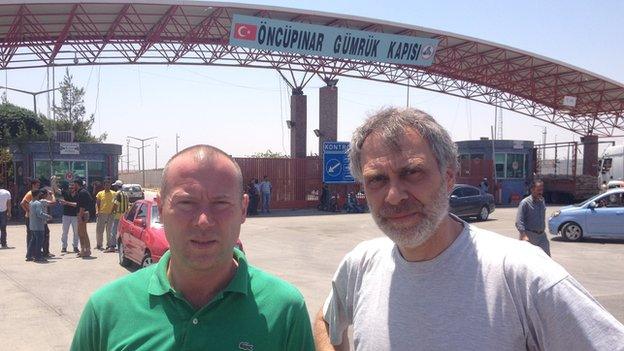
Dimitri Bontinck (left|), another Belgian father, helped Pol Van Hessche with Syrian contacts
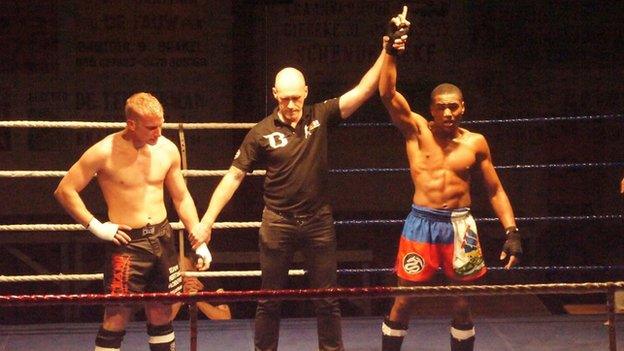
Lucas Van Hessche (right) was in his previous life an accomplished kick-boxer
The pair went missing on 11 June. It later emerged that they had travelled to Syria and joined up with Isis near to their stronghold of Raqqa.
"The boys are staying in the desert, in an international house, with other Europeans, Indonesian and Chinese as well," Mr Van Hessche says. "They are learning Sharia [Islamic law]."
"What did you say to your son?" I ask.
"It was not easy to speak," Mr Van Hessche replies. "Guardians [Isis] were looking at us. It was dangerous. My son looked scared as well."
Mr Van Hessche and the father of Abdelmalek, Idriss Boutalliss, made the dangerous three-day journey to see their sons, across the desert of northern Syria last week. Their two sons refused to leave.
The trip was set up by another Belgian father, Dimitri Bontinck, a former soldier who managed to rescue his own son, Jejoen Bontinck, from Syria last year.
"They heard about me, about my story in the past, that I had succeeded with my son," Mr Bontinck says. "So they contacted me and asked for my help. I said yes."
'Very dangerous'
From his previous trips to Syria, Mr Bontinck has built up a network of contacts. He is reluctant to reveal too many details, but he organised meetings with people high up in different Syrian groups and got permission for the fathers to see their sons.
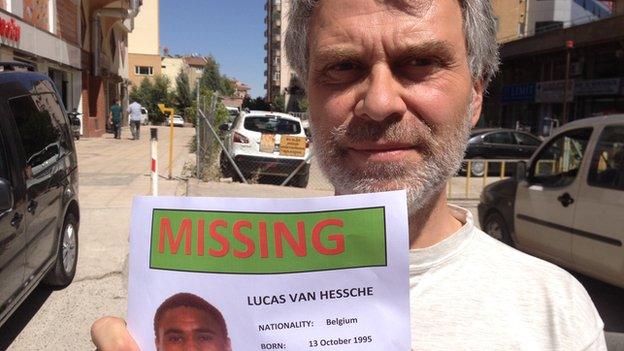
Pol Van Hessche came face-to-face with Isis militants in his effort to persuade his son to leave the ranks of the jihadists
"Everybody said don't go there, they're going to kill you, it is very dangerous," Mr Bontinck says, "but the Amir from Isis gave them permission to see the children. They were protected."
Missing persons leaflets of Lucas Van Hessche and Abdelmalek Boutalliss have been handed out to people in the Syrian-Turkish border town of Kilis.
Lucas is a metal worker and kick-boxer. Originally from Haiti, he was adopted when he was four and brought up a Christian. He converted to Islam three years ago.
Abdelmalek Boutalliss is from Kortrijk and was brought up as a Muslim. He has diabetes. His father brought him his medication and has remained in Syria to try and convince them to leave.
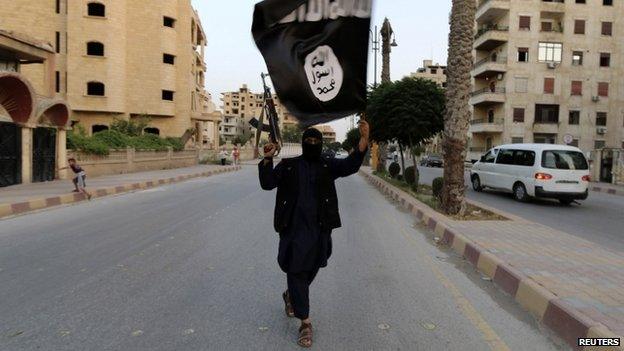
It has emerged that the young men travelled to Syria and joined up with Isis near their stronghold of Raqqa
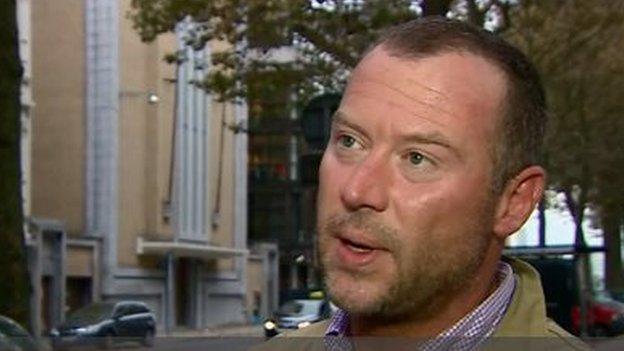
Dimitri Bontinck managed to rescue his own son, Jejoen Bontinck, from Syria last year
Mr Van Hessche says the teenagers must have had help to go to Syria and does not know why they went. He fears they will next be taken to a weapons training camp: "After a few months I think it is to do jihad, but jihad is not only fighting, it is also helping people. I asked Lucas, why not help people in Haiti?"
The two teenagers are among an estimated 2,000 Europeans who have travelled to Syria since the conflict began.
Mr Van Hessche says the two friends are worried about returning to Belgium because they might be arrested.
"The Belgian government must see Lucas as a victim, not a criminal - he has done nothing wrong," he says. "If Lucas stays I will respect it. But I think he doesn't remember all the old things, his friends, his family, because he is in another situation."
Before leaving his son in Syria last week, Mr Van Hessche passed him a note with a message his 15-year-old brother Christopher had written on Facebook.
"Crying every day, sleeping only two hours, walking into your room without your presence, living without your smile," the note said. "Come back, brother, you'd make my life complete again. Do it for us, come back. Life is nothing without you."
At the time of writing there had been no further contact with Lucas, Abdelmalek or his father Idriss in Syria. Pol Van Hessche and Dimitri Bontinck continue to make trips across the border to try and find out information.